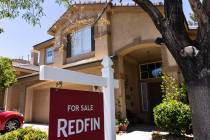Las Vegas foreclosures nearly triple in 2008
In one of the more ominous signs of Las Vegas' crumbling housing market, foreclosures nearly tripled in 2008 from the previous year, Sacramento, Calif.-based Foreclosures.com reported Wednesday.
Lenders took back 31,416 homes in Clark County during the year, compared with 11,509 in 2007. Preforeclosure filings nearly doubled to 67,314 from 33,953 during the period. It's by far the highest numbers since Foreclosures.com began tracking the information.
Nationwide, foreclosures increased 63 percent for the year to about 1 million, plus 2 million filings that could lead to foreclosure, the online foreclosure investment firm reported.
Nevada was No. 8 in the nation with 37,043 foreclosures, far behind California (260,709), Florida (107,833) and Texas (70,037). However, Nevada had the highest foreclosure rate at 4.99 percent.
On a month-by-month basis, Clark County real estate-owned, or bank-owned, properties rose to 3,283 in December from 2,974 in November. Preforeclosures declined to 5,765 from 5,830.
Does it mean more gloom and doom for 2009?
Maybe not, said Alexis McGee, president of Foreclosures.com. She believes the worst of the housing market has passed and is optimistic about a turnaround.
“I think 2009 will surprise many people who have bought into the gloom-and-doom agenda,” McGee said. “In some areas, like California, the housing recovery has already begun.”
California's housing supply has shrunk from a 14-month supply in September 2007 to seven months due to a sharp drop in building permits and housing starts, McGee said.
“I'm not comfortable in saying prices are going to go up,” she said. “We've already dropped 40 percent in value. I think there's more upside risk than downside risk.”
Real estate consultant John Burns of Irvine, Calif., said falling home prices and low mortgage rates have created an environment where housing affordability is now better than average in most areas.
The Pacific Northwest, the Northeast and a few other areas still have affordability problems, but that is changing quickly as prices are tumbling in these areas as well, Burns said.
He shows housing affordability in Las Vegas at 26 percent of household income, based on a median home price of $185,000. Reno is at 32 percent with a median price of $220,000.
Realtor Mark Stark of Prudential Americana Group said he sees no material change in the first two quarters of the year as foreclosed homes continue to hit the marketplace.
More than three-fourths of Las Vegas home sales in December were bank-owned properties, or foreclosures, Stark said. Another 3 percent were short sales, where banks negotiate with homeowners to reduce the mortgage balance based on current value.
Among the bright spots for Las Vegas was the shift in types of loans that were processed, as well as the reduction in overall interest rates. In December, 27 percent of Prudential's closings were cash buyers, 34 percent were FHA loans, 32 percent were conventional loans and 7 percent were VA loans.
Of the 22,000 homes for sale on the Multiple Listing Service, roughly 8,200, or 37 percent, are bank-owned, according to Applied Analysis research firm. “That's a big number,” principal Jeremy Aguero said.
Asking prices on homes continued to fall at the fastest rate in Las Vegas, according to the Real-Time Housing Market Report published by Altos Research and Real IQ.
Prices were down 3.6 percent in December, the ninth straight month that Las Vegas has posted the largest decline among major markets, and down 6.8 percent during the fourth quarter. Listing prices rose at the fastest rate in Salt Lake City, up 1 percent in December.
“Prices continue to fall in most major markets, but the rate of decline was substantially slower in the fourth quarter than it was during the third quarter,” Real IQ research director Stephen Bedikian said.
McGee of Foreclosures.com said she's heard about the “wave” of new foreclosures on the way when adjustable-rate mortgages reset this year, but she doesn't see it.
“I don't see why existing lenders won't reset with a fixed-rate mortgage and let them stay in the home,” she said. “When they do loan modifications, they don't care about equity.”
Contact reporter Hubble Smith at hsmith@reviewjournal.com or 702-383-0491.























